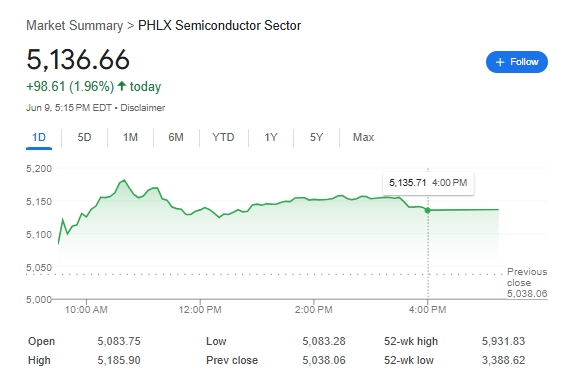China-U.S. London Talks Signal Strongest Concessions Yet, Chip Stocks Surge! Hassett Says "Any" Export Controls to Be Eased
TradingKey - During the first day of the first meeting of the China-U.S. economic and trade consultation mechanism in London, the U.S. conveyed positive progress and a willingness to make broad concessions. News of potential eased semiconductor export restrictions to China boosted the semiconductor index by 2%.
On Monday, June 9, the Philadelphia Semiconductor Index (SOX) rose 1.96% to 5,136.66. Over the past month, the chip index has surged 7.44%, far outpacing the S&P 500’s 2.77% gain.

Philadelphia Semiconductor Index (SOX), Source: Google
Among individual stocks, AMD climbed 4.77%, Synopsys gained 2%, though Nvidia saw a more modest 0.64% increase.
On the 9th, Chinese Vice Premier He Lifeng led a delegation in talks with U.S. Treasury Secretary Scott Bessent’s team in London for the first session of the bilateral economic and trade consultation mechanism. The two sides are set to meet again on the 10th.
President Trump told reporters at the White House that they were doing well with China, acknowledging that China is "not easy," but so far, the reports have been good.
Bessent described the discussions as a "good meeting," while U.S. Commerce Secretary Howard Lutnick called the talks "fruitful."
White House economic adviser Kevin Hassett stated that following the London negotiations, the Trump administration would ease "any" export controls on China, and in return, China would release significant quantities of rare earth materials.
Bloomberg reported that Hassett’s remarks were the clearest signal yet of U.S. willingness to make such concessions. However, he clarified that the most advanced AI chips, such as Nvidia’s H20, would remain restricted.
Insiders revealed that the U.S. government may lift recent export controls on chip design software (EDA), jet engine components, chemicals, and other products.
Though no firm commitments have been made, Trump said, "We’ll see."
The rally in chip stocks helped push the S&P 500 higher, now just 2% below its all-time peak. Wall Street institutions, including JPMorgan and Citigroup, recently raised their year-end targets for the S&P 500, anticipating that the worst of the trade war’s impact has passed.



